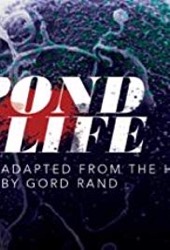- Details
-
Category: Cinéma - Movies
-
Published: Friday, 15 March 2019 04:26
-
Written by Gilbert Seah
The Canadian Film Fest 2019
The Festival will open with Shane Belcourt’s Red Rover, starring Kristian Bruun and Cara Gee following a lonely geologist qualifying for a one-way mission to Mars with the help of an offbeat musician, and will close with Jaren Hayman’s documentary This is North Preston about the economic and racial struggles in the largest black community in the country. Continuing the Festival’s commitment to support Canadian independent films, this year the CFF
introduces a second Homegrown Shorts programme. Nine features and 28 shorts will screen over the five-day event including six World Premieres, ranging in stories from deep exploration to historical satire, intense thrillers to warm romances. The 13th edition of CFF will take place March 19-23 at Cineplex’s Scotiabank Theatre in Toronto. Tickets can be purchased at canfilmfest.ca.
“This year’s lineup is one of the most entertaining programmes yet and we’re
delighted that once again we can give Toronto audiences the opportunity to see
them on the big screen,” said Bern Euler, Executive Director, Canadian Film
Fest. “We are also honoured to welcome award-winning film producer Don
Carmody to our first Producing Masterclass, inspiring and supporting a network
of Canadian artists.”
This year’s feature film highlights include the Toronto Premiere of compelling
documentaries Alone Across the Atlantic about Canada’s greatest living
explorer, Adam Shoalts’ 2017 4,000 km solo journey across the Canadian Arctic,
and Wolves Unleashed: Against All Odds about world renowned animal
trainer, Andrew Simpson and his difficult task training wild Mongolian wolves in
China for the film Wolf Totem; as well as the World Premieres of Gord Rand’s
biting satire Pond Life about suburban dreams and family nightmares.
CFF will also present two incredible Homegrown Shorts programmes for the first
time including the Toronto Premieres of Shelley Thompson’s drama Duck Duck
Goose about an elementary school teacher and her students coping with fear
and guilt during a school lockdown; Juan Riedinger’s A Snake Marked about a
convict forced to examine his own place in the world when his estranged father
visits; and Shane Day’s directorial debut The Desolation Prize, a throwback to
the 60s style hammer horrors, but with a modern edge. The Festival is pleased to
screen seven shorts that will have their World Premieres including Chala
Hunter’s directorial debut Moon Dog with Martha Burns and Alice Snaden.
The Festival will host a number of engaging industry events and workshops
including the first ever Producers Masterclass with legendary producer Don
Carmody exploring small and large budget films; a panel discussion on
transitioning from the big screen to the small screen; and a panel with film festival
programmers on how they programme their events. Visit canfilmfest.ca for details
on the Industry programme in the coming days.
For the complete list of titles for this year’s festival, click on canfilmfest.ca
CAPSULE REVIEWS OF SELECT FILMS:
POND LIFE (Canada 2018) ***
Directed by Gord Rand

POND LIFE settles on a couple at home - a seemingly happily married couple, Dick (Ryan Blakely) and Sandy (Jeanie Calleja), high school sweethearts. The relationship is about to be tested. As Dick makes sexual advances towards his wife (showing a still healthy marriage), Sandy reveals that her sister or foster sister as Dick corrects his wife, Daisy (Kerry McPherson) and boyfriend, Richard (Ryan McVittie) are on their way to visit. Two couples. Two secrets. And a night to celebrate a pregnancy goes haywire. As the film progresses, more plot points are revealed. It seems that Richard and Dick have known each other quite well and in fact have some shady business going, despite many disagreements. The story grows more sinister. POND LIFE turns up a an entertaining quirky tale about couples, the type Canadian films are well-known for.
Trailer: https://vimeo.com/189524970
RED ROVER (Canada 2019) **
Directed by Shane Belcourt
Shane Belcourt performs triple duty as director, co-writer and director of photography about an odd ball geologist (Kristian Bruun) and his relationship with a pretty musician (Cara Gee). Damon, the geologist spends his waking hours searching for that elusive something. Whether it is for deeper meaning, love, or just “treasure” on the beach with his metal detector, it is to no avail. So when Damon meets an offbeat musician named Phoebe handing out flyers for a one way trip to Mars, a bond quickly forms. She’s going to help him find that thing he is looking for by sending him 33.9 million miles away, even though what he needs might be right in front of him. The film hints at a love relationship rather than a plutonic one, and one can hardly tell where everything is heading even half way through the movie. But the waywardness of the two individuals are nothing out of the ordinary and their gatherings grow tiresome quite soon. Bruun and Gee carry the film for all that is worth. The film is shot in Toronto with may familiar sights that should please audiences watching the film at the Canadian Film Fest for which this film has been chosen as the Opening Film.
Trailer: https://vimeo.com/294847271
- Details
-
Category: Cinéma - Movies
-
Published: Sunday, 24 February 2019 00:52
-
Written by Gilbert Seah
CLIMAX (France 2018) ****
Directed b Gaspar Noé

French auteur Gaspar Noé excited audiences with his first two films, the excellent CARNE and the sequel SEUL CONTRE TOUS which were both an hour or so long. But Noé pushed the limits with ENTER THE VOID and IRREVERSIBLE and he continues to do so with his new film CLIMAX about a troupe of dancers on acid.
What can one do with a troupe of real dancers? Noé proves that more than everything can be done. His film can be divided into 5 parts - the interviews; the group dance; the mingling of the dancers; the individual dances; the sex that occurs after the acid takes effect and the climax (aftermath). Even if all else fails, the dance choreography is so good, many done with one long take, that watching these dance segments is worth more than the ticket price. I myself, would watch the film again just for the dance sequences.
The film begins with the dancers being interviewed by an unseen male and female interviewer. This sequence takes about 15 minutes and the audience sees the obsession of the dancers. “Dance is everything.” “I will commit suicide if I cannot dance.” “I would do anything to be able to dance in the troupe.” To the last comment, Noé pursues the implications further, bringing light to the current sexual abuse in the entertainment industry, but with an intelligent difference. The two dancers who make the identical last comment are probed further to the point that their sexual offers might be accepted. Noé uses the males instead of the females to be accosted and the possible guilty party to be one male and one female.
The troupe’s dance number is nothing short of stunning. Forget the dances in any other television show or dance movie. This is the real thing - real dance from the streets, expertly choreographed by gifted dancers.
When the dancers start mingling, the audience discovers more about each individual, their sexual orientation, who each has the hots for and how one might be related to another. This is the time the dancers take to the spiked sangria. The LSD (acid) takes about a hour to take effect.
The film breaks out into dance again. This time it is individual dance where each dancer is given the chance to perform solo. Noé uses the overhead shot. The camera displaced above and each dancer moves in a and then out of the spot, with the dance performance seen from a bird’s eye view. It is uncommon to shoot dance numbers this way, but it is nevertheless inventive and effective.
The last two segments are not so easy to watch. Once the dancers start to feel the effect of the drug, their emotions come loose and sex begins leading to the films climax which unfortunately is not so entertaining as the dance sequences. Noé’s camera goes upside down with lighting going on and off so that not every scene can be deciphered clearly.
Noé never fails to shock and to push his filming limits. CLIMAX shows Noé at one of his most effective, disturbing though not disgusting.
Trailer: https://www.youtube.com/watch?v=2AuDB8pskGs






